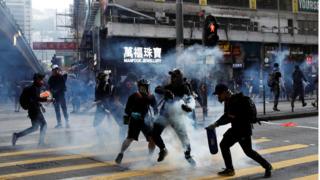[ad_1]

Image copyright
Reuters
The protests have raged for months – but now expat workers are looking to leave the financial hub
“I’ve been tear gassed a few times, but never when I was outside my office – popping out to get my lunch,” says one trader at HSBC.
He is describing the moment this week when Hong Kong’s protests came to the central financial district , one of the world’s biggest commercial hubs.
He says it was a watershed moment, that’s made him and many of his peers question their future in the city.
Speaking to the BBC under condition of anonymity, directors at some of the biggest international banks and law firms said they are seeing their business in Hong Kong shrink as the protests continue to escalate.
Financial services make up a fifth of Hong Kong’s economy and people come from all over the world to live and work here. Its large expatriate community is attracted by the low taxes, well-paid jobs, stability and high standards of living.
However, the lure of prosperity and stability in the East Asian hub has been undermined substantially since Hong Kong has been racked by five months of anti-government protests, backing increased democracy and opposing the actions of the police.
Image copyright
EPA
The action has been labelled the “umbrella protests”
Panic button
This last week where violence has intensified has made many firms reconsider the safety of their staff in the city.
One hedge fund manager has even been given a panic button app in case of an emergency and plans are in place with his work to evacuate him and his family to another major city “if we were in danger they have a team of people who would get us out”.
A banker at HSBC says only half of their staff came in to the office on Friday as people are encouraged to work remotely if they can’t get in safely.
Staff are kept closely informed about the situation on the ground according to a BNP Paribas employee “We get regular emails early in the morning and through the day from the business continuity management team – telling us whether it’s safe to go into offices – and whether we should go home early.”
‘Pro-protester or pro-police’
Anecdotally, the political pressure from the Chinese government on banks and law firms is also growing – and it’s putting pressure on staff.
Some partners in law firms are being asked to pin their colours to the mast and state whether they support the protesters or the Chinese government before winning business from Chinese firms.
Image copyright
Reuters
Police have faced off with protesters alarmed at growing influence from Beijing
Firms are under pressure to keep a lid on their staff speaking in public about their views.
One lawyer explains “I’ve been on calls where people are asked to verbally communicate restraint and caution when sharing their views. Given the amount of people we employ here, it’s a minor miracle nothing has happened”.
In the workplace, people are making informal rules not to discuss the subject within their teams because emotions are running so high.
“Clearly it’s the only topic of conversation in the office, but opinions are so split,” one banker says.
“In my team of nine, three are Chinese and two are Hong Kong Chinese and the rest are expats – it’s a bit like Brexit – we all have violently different views.”
A video on social media of a man who claims to work at Citigroup being arrested by police has been widely shared in the banking community.
“This has scared people here – it makes you feel we could all get caught up in this”
A spokesperson for the US-headquartered banking group said: “We are investigating this incident and while investigations continue it would be inappropriate to comment further”.
Image copyright
AFP
The issue of democracy in Hong Kong is fraught
Losing business to Singapore
One of the biggest concerns for financial firms is the impact all of this is having on the economy as its reputation for stability unravels.
A source at one of the world’s biggest international banks says it expects its Hong Kong revenue to be down by 25% in the last quarter of their financial year as a result of the violence.
Many banks are now reviewing their investment plans in Hong Kong over the next few years “If we’re still talking about this in six months time, people will start giving up on Hong Kong”
They are concerned that people who are planning major deals will now turn to banks and law firms in Singapore because, in the words of one, “it has a more predictable medium-term outlook”.
Image copyright
EPA
Hong Kong has long been a financial services hub in Asia
So far most of the business impact has been on small companies – restaurants for example. There is concern amongst bankers, borne out in recent economic statistics, that this could spread more widely.
“The classic company we deal with would be lending money to a Chinese shipping company that does its financial transactions through HK. They rely on a healthy business environment in Hong Kong. Now we worry they will go bankrupt”.
[ad_2]
Source link


